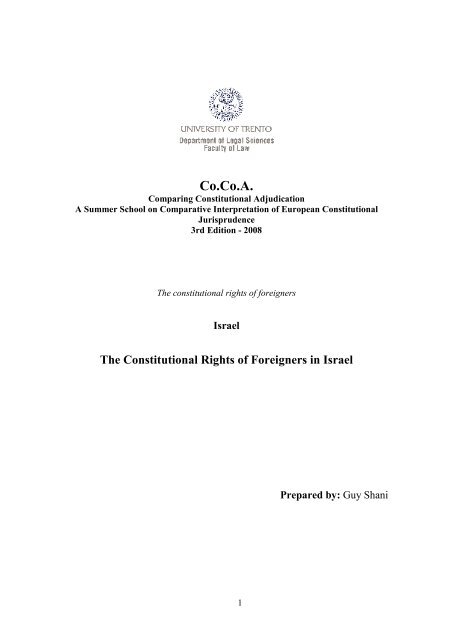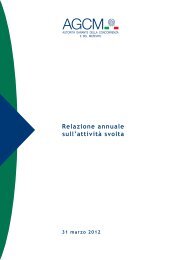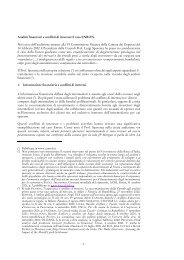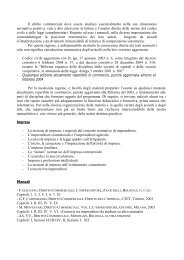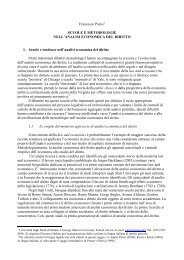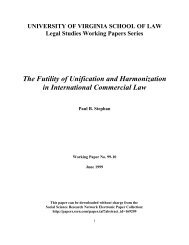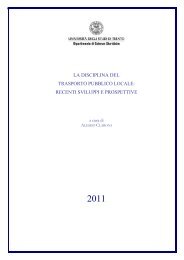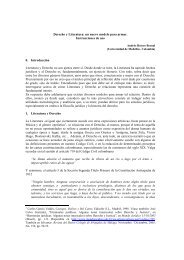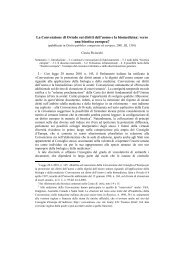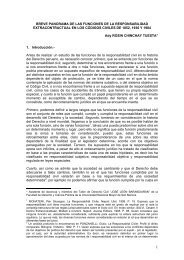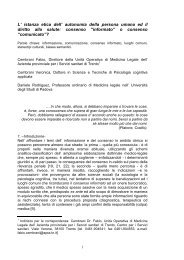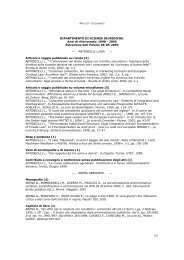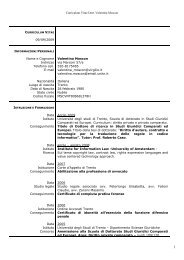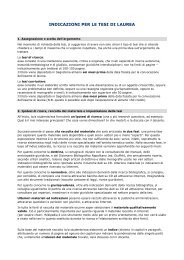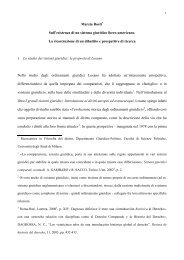Israel , Guy Shani, The Constitutional Rights of Foreigners in Israel
Israel , Guy Shani, The Constitutional Rights of Foreigners in Israel
Israel , Guy Shani, The Constitutional Rights of Foreigners in Israel
Create successful ePaper yourself
Turn your PDF publications into a flip-book with our unique Google optimized e-Paper software.
Co.Co.A.<br />
Compar<strong>in</strong>g <strong>Constitutional</strong> Adjudication<br />
A Summer School on Comparative Interpretation <strong>of</strong> European <strong>Constitutional</strong><br />
Jurisprudence<br />
3rd Edition - 2008<br />
<strong>The</strong> constitutional rights <strong>of</strong> foreigners<br />
<strong>Israel</strong><br />
<strong>The</strong> <strong>Constitutional</strong> <strong>Rights</strong> <strong>of</strong> <strong>Foreigners</strong> <strong>in</strong> <strong>Israel</strong><br />
Prepared by: <strong>Guy</strong> <strong>Shani</strong><br />
1
<strong>The</strong> <strong>Constitutional</strong> <strong>Rights</strong> <strong>of</strong> <strong>Foreigners</strong> <strong>in</strong> <strong>Israel</strong><br />
<strong>Guy</strong> <strong>Shani</strong><br />
1. General<br />
<strong>The</strong> Supreme Court <strong>of</strong> <strong>Israel</strong> has always considered the protection <strong>of</strong> human<br />
rights to be one <strong>of</strong> its ma<strong>in</strong> functions. Until 1992, the Supreme Court's protection <strong>of</strong><br />
human rights evolved as part <strong>of</strong> <strong>Israel</strong>i common law. Utiliz<strong>in</strong>g its central role <strong>in</strong> the<br />
<strong>in</strong>terpretation <strong>of</strong> laws and its power <strong>of</strong> judicial review <strong>of</strong> adm<strong>in</strong>istrative acts, the<br />
Supreme Court developed an important foundation for protect<strong>in</strong>g human rights such as<br />
freedom <strong>of</strong> speech, equality and the right to assemble 1 . S<strong>in</strong>ce 1992, the constitutional<br />
protection <strong>of</strong> human rights <strong>in</strong> <strong>Israel</strong> has been strengthened by the application <strong>of</strong> two<br />
Basic Laws – Basic Law: Human Dignity and Liberty, and Basic Law: Freedom <strong>of</strong><br />
Occupation. Although these Basic Laws do not expressly authorize judicial<br />
constitutional review, a panel <strong>of</strong> n<strong>in</strong>e <strong>Israel</strong>i Supreme Court judges held that the Court is<br />
authorized to <strong>in</strong>validate legislation if it <strong>in</strong>fr<strong>in</strong>ges on basic constitutional rights 2 .<br />
<strong>The</strong> language <strong>of</strong> Basic Law: Human Dignity and Liberty refers generally to<br />
human be<strong>in</strong>gs—and not only to citizens. For example, Article 2 provides that "<strong>The</strong>re<br />
shall be no violation <strong>of</strong> the life, body or dignity <strong>of</strong> any person as such" 3 . Article 3 states<br />
that "<strong>The</strong>re shall be no violation <strong>of</strong> the property <strong>of</strong> a person." Article 4 provides that<br />
"All persons are entitled to protection <strong>of</strong> their life, body and dignity." <strong>The</strong> rema<strong>in</strong><strong>in</strong>g<br />
Articles similarly refer to people rather than to citizens 4 . <strong>The</strong> only exception is Article<br />
1 See, e.g., HCJ 73/53 "Kol Ha-am" Co. Ltd. v. M<strong>in</strong>ister <strong>of</strong> the Interior [1953] IsrSC 7(2) 871; HCJ<br />
153/87 Shakdiel v. M<strong>in</strong>ister <strong>of</strong> Religious Affairs [1988] IsrSC 42(2) 221.<br />
2 See CA 6821/93 Bank Hamizrahi Ltd. v. Migdal [1995] IsrSC 49(2) 221.<br />
3 Emphases here, and <strong>in</strong> the next quotations, are added.<br />
4 Article 5: "<strong>The</strong>re shall be no deprivation or restriction <strong>of</strong> the liberty <strong>of</strong> a person by imprisonment, arrest,<br />
extradition or otherwise."<br />
2
6(b), accord<strong>in</strong>g to which "Every <strong>Israel</strong>i national has the right <strong>of</strong> entry <strong>in</strong>to <strong>Israel</strong> from<br />
abroad." In Basic Law: Freedom <strong>of</strong> Occupation, Article 3 states that: "Every <strong>Israel</strong>i<br />
national or resident has the right to engage <strong>in</strong> any occupation, pr<strong>of</strong>ession or trade."<br />
<strong>The</strong> word<strong>in</strong>g <strong>of</strong> the Basic Laws therefore implies that constitutional protection is<br />
not restricted to citizens or residents. Nevertheless, questions still arise as to the<br />
application <strong>of</strong> the constitutional protection with regard to non-citizens and as to the<br />
balance between the protected rights, both amongst themselves and with countervail<strong>in</strong>g<br />
<strong>in</strong>terests. In this paper I would like to <strong>in</strong>troduce the <strong>Israel</strong>i Supreme Court's view on two<br />
issues relat<strong>in</strong>g to the constitutional rights <strong>of</strong> foreigners. <strong>The</strong> first issue concerns the<br />
constitutional rights <strong>of</strong> foreign workers <strong>in</strong> <strong>Israel</strong>. <strong>The</strong> second issue deals with the<br />
protection <strong>of</strong> human rights <strong>of</strong> Palest<strong>in</strong>ians.<br />
2. <strong>The</strong> constitutional rights <strong>of</strong> foreign workers <strong>in</strong> <strong>Israel</strong><br />
I beg<strong>in</strong> with the question <strong>of</strong> the constitutional rights <strong>of</strong> foreign workers <strong>in</strong> <strong>Israel</strong>.<br />
Over the last two decades, the State <strong>of</strong> <strong>Israel</strong> has become a desirable dest<strong>in</strong>ation for<br />
foreign workers. <strong>The</strong>se men and women come to <strong>Israel</strong> from different countries seek<strong>in</strong>g<br />
employment <strong>in</strong> various sectors <strong>of</strong> the economy, particularly agriculture, construction,<br />
nurs<strong>in</strong>g, and manufactur<strong>in</strong>g. This migration <strong>of</strong> workers—many <strong>of</strong> whom come to <strong>Israel</strong><br />
illegally—raise many problems because <strong>of</strong> their <strong>in</strong>fluence on the employment structure,<br />
the level <strong>of</strong> wages, and <strong>in</strong>ternal unemployment. On the other hand, it is apparent that<br />
these foreign workers, as human be<strong>in</strong>gs, are entitled to be treated with respect, and that<br />
their human dignity should not be overlooked.<br />
Article 6 (a): "All persons are free to leave <strong>Israel</strong>."<br />
Article 7: "(a) All persons have the right to privacy and to <strong>in</strong>timacy; (b) <strong>The</strong>re shall be no entry <strong>in</strong>to the<br />
private premises <strong>of</strong> a person who has not consented thereto; (c) No search shall be conducted on the<br />
private premises <strong>of</strong> a person, nor <strong>in</strong> the body or personal effects; (d) <strong>The</strong>re shall be no violation <strong>of</strong> the<br />
confidentiality <strong>of</strong> conversation, or <strong>of</strong> the writ<strong>in</strong>gs or records <strong>of</strong> a person."<br />
3
Foreign workers are amongst the weakest groups <strong>in</strong> society. Often, they are<br />
almost <strong>in</strong>visible. As the Supreme Court noted <strong>in</strong> Kav LaOved Worker's Hotl<strong>in</strong>e v.<br />
Government <strong>of</strong> <strong>Israel</strong> 5 : "A large number <strong>of</strong> the migrants suffer from low liv<strong>in</strong>g and<br />
work conditions . . . and sometimes also from negative label<strong>in</strong>g and social hostility."<br />
Moreover, <strong>in</strong> many cases, foreign workers are either unaware <strong>of</strong> their constitutional<br />
rights or unable to br<strong>in</strong>g their case before the Supreme Court act<strong>in</strong>g as the High Court<br />
<strong>of</strong> Justice. This is only somewhat mitigated by the aid <strong>of</strong> non-pr<strong>of</strong>it organizations.<br />
In Kav LaOved Worker's Hotl<strong>in</strong>e, a petition was brought to the <strong>Israel</strong>i Supreme<br />
Court question<strong>in</strong>g the government's policy <strong>of</strong> grant<strong>in</strong>g work permits that are tied to a<br />
specific employer. <strong>The</strong> policy is known as the “restrictive employment arrangement” or<br />
“the cha<strong>in</strong><strong>in</strong>g arrangement,” because term<strong>in</strong>ation <strong>of</strong> a migrant worker's employment<br />
converts him to an illegal alien, which <strong>in</strong> turn puts him at risk <strong>of</strong> arrest and deportation.<br />
<strong>The</strong> petitioners challenged the policy, argu<strong>in</strong>g that it violates the foreign workers'<br />
dignity and liberty, underm<strong>in</strong>es their barga<strong>in</strong><strong>in</strong>g power <strong>in</strong> the employment market, and<br />
grants substantial leverage to abusive employers who violate labour laws. <strong>The</strong><br />
respondents replied, <strong>in</strong>ter alia, that the restrictive employment arrangement is essential<br />
to ensur<strong>in</strong>g the supervision <strong>of</strong> foreign workers <strong>in</strong> <strong>Israel</strong>.<br />
<strong>The</strong> Supreme Court struck down the government's policy on the ground that it<br />
violated the rights <strong>of</strong> foreign workers. <strong>The</strong> Court did not overlook the need to ma<strong>in</strong>ta<strong>in</strong><br />
supervision <strong>of</strong> foreign workers <strong>in</strong> <strong>Israel</strong>. But it was decided that the <strong>in</strong>fr<strong>in</strong>gement <strong>of</strong> the<br />
rights <strong>of</strong> the foreign workers was disproportionate with respect to this objective. In the<br />
words <strong>of</strong> Justice Levi:<br />
5 HCJ 4542/02 Kav LaOved Worker's Hotl<strong>in</strong>e v. Government <strong>of</strong> <strong>Israel</strong> [2006], for English translation see<br />
http://elyon1.court.gov.il/files_eng/02/420/045/o28/02045420.o28.htm.<br />
4
<strong>The</strong> restrictive employment arrangement violates the basic rights <strong>of</strong> the<br />
foreign workers. It violates the <strong>in</strong>herent right to liberty. It violates human<br />
freedom <strong>of</strong> action. It denies the autonomy <strong>of</strong> the free will. It tramples the<br />
basic right to be released from a work contract. It takes away a basic<br />
economic barga<strong>in</strong><strong>in</strong>g power from a party to employment relations who is<br />
already weak. By do<strong>in</strong>g all this, the restrictive employment arrangement<br />
violates his human dignity and liberty <strong>in</strong> the most basic sense.<br />
Human dignity is the cornerstone <strong>of</strong> all human rights <strong>in</strong> <strong>Israel</strong>. Human dignity<br />
was broadly construed by the <strong>Israel</strong>i Supreme Court, which held that every human be<strong>in</strong>g<br />
is autonomous and free, may develop mentally and physically as she pleases, and write<br />
the story <strong>of</strong> her life as she chooses. Two assertions regard<strong>in</strong>g human dignity lay at the<br />
heart <strong>of</strong> the Court's decision In Kav LaOved Worker's Hotl<strong>in</strong>e: first, the Court held that<br />
the restrictive employment arrangement compels foreign workers to choose between<br />
two evils: cont<strong>in</strong>ue work<strong>in</strong>g for an employer aga<strong>in</strong>st their will or lose their permit to<br />
reside <strong>in</strong> <strong>Israel</strong>. By do<strong>in</strong>g so, the arrangement stands <strong>in</strong> stark contrast to the value <strong>of</strong><br />
human dignity. Second, the Court held that foreign workers, just as citizens, are entitled<br />
to human dignity. <strong>The</strong> comb<strong>in</strong>ation <strong>of</strong> these factors led the Court to strike down the<br />
governmental policy.<br />
In support <strong>of</strong> this decision, the Court drew upon various legal sources, such as<br />
<strong>in</strong>ternational law, as well as non-legal sources, such as Jewish heritage and Jewish<br />
history. For example, the Court stressed that the right to work free <strong>of</strong> coercion is<br />
enshr<strong>in</strong>ed <strong>in</strong> <strong>in</strong>ternational conventions. In regards to universal values, Justice Chesh<strong>in</strong><br />
went as far as to quote the Bible: “And you shall not oppress a stranger, nor shall you<br />
pressurize him, for you were strangers <strong>in</strong> the land <strong>of</strong> Egypt (Exodus 22, 20).” Justice<br />
Chesh<strong>in</strong> concluded:<br />
5
A study <strong>of</strong> the restrictive arrangement that the state created and applied<br />
to foreign workers—unfortunate persons who are separated from their<br />
families for months, and even years—gives rise to astonishment m<strong>in</strong>gled<br />
with anger: how can persons <strong>in</strong> authority <strong>in</strong> our country th<strong>in</strong>k that they<br />
can treat <strong>in</strong> this way women and men who only want to provide for their<br />
families . . . Every human be<strong>in</strong>g—even if he is a foreigner—is entitled<br />
to his dignity as a human be<strong>in</strong>g.<br />
I believe that this is a remarkable decision. It is courageous <strong>in</strong> its protection <strong>of</strong> a<br />
disempowered group, sensitive <strong>in</strong> its humanity, and pr<strong>of</strong>oundly written. Moreover, the<br />
Supreme Court acknowledged, without hesitation, that basic constitutional rights apply<br />
to foreign workers.<br />
3. <strong>The</strong> protection <strong>of</strong> human rights <strong>in</strong> times <strong>of</strong> conflict<br />
<strong>The</strong> question <strong>of</strong> protect<strong>in</strong>g human rights <strong>of</strong> foreigners becomes all the more<br />
difficult when it comes to the <strong>Israel</strong>i-Palest<strong>in</strong>ian conflict. Of course, this issue raises<br />
many questions that cannot be exam<strong>in</strong>ed comprehensively <strong>in</strong> this short paper, but I will<br />
try to demonstrate some <strong>of</strong> the dilemmas. One complexity stems from the fact that the<br />
territories <strong>of</strong> Judea and Samaria ("the West Bank") fall under multiple jurisdictions.<br />
<strong>Israel</strong>i law and adm<strong>in</strong>istration are explicitly applied to East Jerusalem, but not to the<br />
territories, which are subject to belligerent occupation and are not considered part <strong>of</strong><br />
<strong>Israel</strong>. <strong>The</strong> legislation <strong>in</strong> these territories is comprised <strong>of</strong> two ma<strong>in</strong> layers: Jordanian law<br />
and ord<strong>in</strong>ances issued by the <strong>Israel</strong>i military command. This jurisdictional arrangement<br />
is prescribed by <strong>in</strong>ternational law, but the plot thickens: <strong>Israel</strong>i citizens resid<strong>in</strong>g <strong>in</strong> the<br />
occupied territories are subject to many <strong>Israel</strong>i provisions that apply to them <strong>in</strong><br />
personam. <strong>The</strong> Supreme Court still has not decided whether the Basic Laws protect<strong>in</strong>g<br />
human rights generally apply to the territories located beyond <strong>Israel</strong>i borders. In one<br />
6
case, the Court held that they apply to <strong>Israel</strong>i settlers <strong>in</strong> personam, 6 but the question <strong>of</strong><br />
whether basic constitutional rights apply to non-<strong>Israel</strong>i citizens rema<strong>in</strong>ed unanswered.<br />
This maze <strong>of</strong> jurisdictions sometimes creates constitutional questions. For<br />
example, <strong>in</strong> a recent petition filed to the Supreme Court, Palest<strong>in</strong>ian employees <strong>of</strong><br />
<strong>Israel</strong>i employers <strong>in</strong> the occupied territories claimed that the labor law govern<strong>in</strong>g their<br />
labor relations is the <strong>Israel</strong>i labor law, not the local Jordanian law which is less<br />
beneficial to workers. 7 Exam<strong>in</strong><strong>in</strong>g the unique jurisdictional situation <strong>in</strong> these territories,<br />
the Supreme Court found <strong>in</strong> favor <strong>of</strong> the Palest<strong>in</strong>ian petitioners. Several reasons led the<br />
Court to this outcome; the most relevant one perta<strong>in</strong>s to the equality consideration.<br />
<strong>The</strong> Court emphasized that the solution to the conflict <strong>of</strong> laws must conform<br />
with the constitutional right to equality. Subject<strong>in</strong>g Palest<strong>in</strong>ian employees <strong>of</strong> <strong>Israel</strong>i<br />
employers <strong>in</strong> the settlements to Jordanian labor law while apply<strong>in</strong>g the more liberal<br />
<strong>Israel</strong>i labor law to their <strong>Israel</strong>i co-workers, was deemed unlawful discrim<strong>in</strong>ation.<br />
Stat<strong>in</strong>g that “Such a differentiation, based on citizenship or nationality, is wrong,” the<br />
Court concluded that <strong>Israel</strong>i law governs the labor contracts <strong>of</strong> Palest<strong>in</strong>ian employees <strong>in</strong><br />
the territories, just as it governs the labor contracts <strong>of</strong> their <strong>Israel</strong>i co-workers.<br />
Maybe the most difficult question is the protection <strong>of</strong> human rights <strong>of</strong> a different<br />
category <strong>of</strong> Palest<strong>in</strong>ian foreigners—those belong<strong>in</strong>g to a group that is engaged <strong>in</strong><br />
terrorist activity. For many years, <strong>Israel</strong> has been battl<strong>in</strong>g terrorism. This <strong>in</strong>evitably<br />
presents one <strong>of</strong> the most difficult challenges a democratic state and its judicial system<br />
can face: balanc<strong>in</strong>g the need to safeguard national security with the desire to safeguard<br />
6 See HCJ 1661/05 Regional Council H<strong>of</strong> Aza v. <strong>Israel</strong>i Knesset [2005] IsrSC 59(2) 481.<br />
7<br />
See HCJ 5666/03 Kav LaOved Worker's Hotl<strong>in</strong>e v. National Labor Court [2007],<br />
http://elyon1.court.gov.il/files/03/660/056/P17/03056660.p17.htm.<br />
7
human rights. <strong>The</strong> fact that <strong>Israel</strong> is experienc<strong>in</strong>g an almost permanent state <strong>of</strong><br />
emergency complicates this delicate balanc<strong>in</strong>g act even further.<br />
From the outset, it was clear to the Court that, <strong>in</strong> spite <strong>of</strong> the security difficulties<br />
fac<strong>in</strong>g <strong>Israel</strong>, it had to ensure that the State acts with<strong>in</strong> the rule <strong>of</strong> law. On the domestic<br />
plane, this meant uphold<strong>in</strong>g adm<strong>in</strong>istrative and constitutional law; on the <strong>in</strong>ternational<br />
plane, this meant adher<strong>in</strong>g to <strong>in</strong>ternational law and pr<strong>in</strong>ciples. While the <strong>Israel</strong>i Supreme<br />
Court recognized that human rights cannot serve as a tool for national destruction, it<br />
also stressed that national necessity cannot justify widespread <strong>in</strong>fr<strong>in</strong>gement <strong>of</strong> human<br />
rights.<br />
Critics <strong>of</strong> the Court argue that security considerations must prevail when they<br />
conflict with human rights. <strong>The</strong> Court's jurisprudence on this po<strong>in</strong>t is clear. A state <strong>of</strong><br />
emergency does not justify the neglect <strong>of</strong> legal norms and constitutional values.<br />
Although the Court acknowledged that it lacked military expertise and refra<strong>in</strong>ed from<br />
<strong>in</strong>terfer<strong>in</strong>g with military considerations per se, it did not hesitate to <strong>in</strong>tervene <strong>in</strong> what it<br />
considered to be its area <strong>of</strong> expertise and responsibility: the considerations <strong>of</strong> equality,<br />
human dignity, and freedom. Thus, the Supreme Court was faced with the daunt<strong>in</strong>g<br />
challenge <strong>of</strong> strik<strong>in</strong>g a balance—which may vary from case to case—between these two<br />
em<strong>in</strong>ent and clash<strong>in</strong>g considerations.<br />
To illustrate this po<strong>in</strong>t, I will describe an <strong>Israel</strong>i Supreme Court case that<br />
concerned the issue <strong>of</strong> <strong>in</strong>terrogation methods, requir<strong>in</strong>g the Court to balance the<br />
<strong>in</strong>terests <strong>of</strong> national security with the human rights <strong>of</strong> Palest<strong>in</strong>ian suspected <strong>of</strong> be<strong>in</strong>g<br />
<strong>in</strong>volved <strong>in</strong> terrorist activity. 8 <strong>The</strong> case dealt with the General Security Services, the<br />
8 HCJ 5100/94 Public Committee Aga<strong>in</strong>st Torture <strong>in</strong> <strong>Israel</strong> v. <strong>Israel</strong>i Government [1999] IsrSC 53(4) 817.<br />
8
agency charged with ensur<strong>in</strong>g <strong>Israel</strong>'s <strong>in</strong>ternal security. As part <strong>of</strong> its task <strong>of</strong> gather<strong>in</strong>g<br />
<strong>in</strong>formation <strong>in</strong> order to prevent security breaches, the Service <strong>in</strong>terrogates suspected<br />
terrorists. <strong>The</strong> Supreme Court was petitioned regard<strong>in</strong>g the Service's use <strong>of</strong><br />
extraord<strong>in</strong>ary <strong>in</strong>terrogation techniques.<br />
In a landmark decision, the Court held that the General Security Service is not<br />
authorized to use physical means dur<strong>in</strong>g the <strong>in</strong>terrogation <strong>of</strong> Palest<strong>in</strong>ian terror suspects.<br />
<strong>The</strong> Court was <strong>of</strong> the op<strong>in</strong>ion that <strong>in</strong>terrogation methods must not <strong>in</strong>fr<strong>in</strong>ge on the<br />
dignity and <strong>in</strong>dividual privacy <strong>of</strong> deta<strong>in</strong>ees, thus recogniz<strong>in</strong>g their basic constitutional<br />
rights. <strong>The</strong> Court candidly admitted that the decision <strong>in</strong> this case was difficult—not so<br />
much because <strong>of</strong> the legal questions, but rather because—and I quote:<br />
We [the Judges] are part <strong>of</strong> the <strong>Israel</strong>i society. We are familiar with the<br />
harsh reality <strong>of</strong> terror <strong>Israel</strong> is fac<strong>in</strong>g. We fear that our verdict will<br />
prevent appropriate fight aga<strong>in</strong>st terror. But we are judges. We have to<br />
comply with the law just as we demand others to do. We have to follow<br />
our conscience and our recognition <strong>of</strong> the law.<br />
That be<strong>in</strong>g said, the Court ended its verdict with these words:<br />
Sometimes democracy fights with one <strong>of</strong> its hands tied beh<strong>in</strong>d her back.<br />
Nevertheless, democracy has the upper hand because protect<strong>in</strong>g the rule<br />
<strong>of</strong> law and recogniz<strong>in</strong>g human rights is an essential aspect <strong>of</strong> its security.<br />
Follow<strong>in</strong>g the decision, the General Security Services revised their <strong>in</strong>terrogation<br />
methods to comply with the Court's decision.<br />
In conclusion, the cases I presented demonstrate the Supreme Court's will<strong>in</strong>gness<br />
to uphold and protect the constitutional rights <strong>of</strong> foreigners, despite substantial oppos<strong>in</strong>g<br />
9
considerations and, even more importantly, to do so <strong>in</strong> the face <strong>of</strong> oppos<strong>in</strong>g public<br />
op<strong>in</strong>ion. <strong>The</strong> execution and ultimate acceptance <strong>of</strong> the Court's verdicts are a testament<br />
to both the respect it commands and to the soundness <strong>of</strong> its judgment.<br />
10


